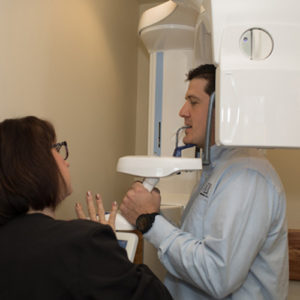 Serving patients of Erwin, Jonesborough, and Greeneville, TN
Serving patients of Erwin, Jonesborough, and Greeneville, TN
Temporomandibular joint disorder, or TMJ for short, can cause you profound pain while affecting both your oral health and overall health. It is often a result of missing teeth, which can make your bite become uneven.
TMJ and its Symptoms
TMJ occurs when there is a dysfunction in the temporomandibular joint itself. Common consequences of this dysfunction include malocclusion (also known as a bad bite) or a jaw misalignment. Even the slightest change in your mouth, such as one single missing tooth, can result in a dysfunction of the jaw joints.
This dysfunction typically is caused by any of the following:
- Missing teeth
- Bruxism (clenching and grinding of teeth)
- Broken or damaged teeth that interfere with occlusion
- Injury to the face or mouth
- And more!
You may be wondering, what is the problem with a missing tooth? The truth is, even one single missing tooth can wreak havoc on your occlusion, resulting in TMJ pain or worse. Think of it this way, it is similar to a car in which one wheel that is slightly out of alignment eventually affects how a car drives, and if ignored, will manifest into more problems that end up costing more money in repairs to your vehicle.
Our mouths are the same way – just one missing tooth can result in teeth that drift out of alignment, loss of jawbone, and even damage to your existing teeth that all results in symptoms of TMJ, which include:
- Teeth that are worn, chipped, cracked, or loose
- Teeth that are crooked or out of alignment
- Mouth pain that migrates to different areas
- Facial pain
- Lockjaw
- Clicking, popping, or grating sounds in the jaw
- Numbness in the extremities
- Congested or stuffy ears
- Ringing in ears
- Frequent headaches of migraine-like intensity
- And more!
The consequences of TMJ
Pain is a common symptom of TMJ. This may manifest as neck pain, shoulder pain, or back pain. It also could result in headaches of migraine-like intensity. If you have been diagnosed with migraines but do not respond to standard treatments, then TMJ could be the cause. This is because of the proximity of the temporomandibular joint to the trigeminal nerve, which carries more sensory input than any other neural pathway—even the spinal cord.
Since the effects of TMJ are so far-reaching, it is important to undergo a TMJ evaluation if you experience jaw pain or chronic head and neck pain, or if you have missing teeth—especially as a result of periodontal disease.
Treatment for TMJ in Greeneville
No medical professional is better qualified to diagnose and treat TMJ than neuromuscular dentistry, a specialized field that requires additional education and training to study jaw alignment, and the specific disorder of TMJ.
At Tusculum Dental Care, we can treat TMJ through the use of a mandibular advancement device, an oral appliance that places the lower jaw forward into the ideal resting position. Gradually, this device restores the proper alignment of your jaw and bite, relieving TMJ and its associated symptoms.
If you think you have TMJ or you have been diagnosed with the disorder by another medical professional, Tusculum Dental Care can help. Call our office at (423) 639-7575 to schedule a consultation.
Tusculum Dental Care is here to serve patients living in the areas of Greeneville, Jonesborough, and Erwin, Tennessee.

